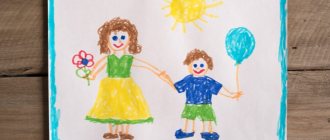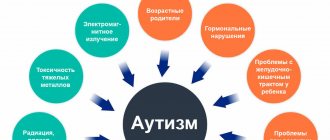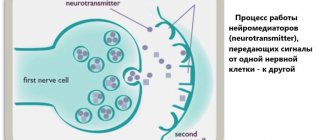If a person has the habit of repeating words after his interlocutor, without really understanding the meaning of what was said, this phenomenon may indicate the presence of echolalia. This diagnosis is made for a specific neurological disorder. Although sometimes echolalia can act as a form of natural speech development in a child.
What is echolalia, echophrasia? Definition
Echolalia is characterized by spontaneous, compulsive, meaningless
uncontrolled person automatic repetition of sounds, syllables, words that are heard in the speech of other people. Moreover, even the intonation of the words heard can be preserved. The term echolalia comes from the Greek words “echo,” which means “reflection of sound,” and “lalia,” which means “speech,” or “laleo,” which means “speak.” In ancient Greek mythology, there was a nymph named Echo. She was petrified. All that was left of her was her voice. The voice repeated the endings of words that people uttered in her presence. A synonym is echophrasia .
When does echolalia occur?
In what pathological conditions, diseases, illnesses does echolalia occur? Echolalia can more often be observed in various neurological and mental diseases, such as Tourette's syndrome (Gilles de la Tourette's disease), autism (early childhood autism, autistic behavior, autism spectrum, autistic character traits), Andreas Rett syndrome, schizophrenia (catatonic), mental retardation (dementia, mental retardation, imbecility, debility), dysphasia, damage to the frontal lobes of the brain. Normally, echolalia occurs as a stage of speech development in children aged 6 months to 3 years, when the child repeats the words he hears, thus learning speech. If a child at 3 years of age and later repeats or shouts words, then this is a sign of a serious pathology. In this case, you should immediately consult a doctor.
Diagnostics
You should consult a neurologist, speech therapist, speech pathologist, or psychiatrist if echolalia is observed in a child after 4 years of age . After talking with a young patient, getting acquainted with characteristics from the garden, from parents, and conducting a simple test, the doctor will be able to understand whether the habit of repeating is normal or pathological.
If a neurologist or psychiatrist suspects any disorders, additional laboratory and instrumental tests will be needed. The baby needs to go through:
- Ultrasound of the brain
- Electroencephalogram
- MRI
- Examination by an ENT doctor
It is necessary to detect pathology with the help of additional tests after 4-5 years. The prognosis for the future depends on the diagnosis and the ability of the baby and parents to work to eliminate it.
Advice! It is important for mothers of children with mental retardation and autism to get rid of stereotypes. Psychiatry is considered an unpopular science and branch of medicine among young parents due to the fear of “scary” certificates of illness for life. The important thing is not what is written in the child’s card, but how quickly you contact the doctor and how quickly you can help the child cope with the problem. Competent psychologists and psychiatrists set themselves precisely this task. It is not advisable to delay treatment.
Types of echolalia: immediate, delayed, true, mitigated
Reflexotherapists, neurologists, and psychiatrists distinguish 2 types of echolalia : immediate echolalia, delayed echolalia (delayed). In immediate echolalia, the child immediately repeats a word after hearing it from a person or any other sound source. With delayed echolalia, children repeat previously heard words after a long period of time. Several minutes or several years may pass after hearing the phrase. Delayed echolalia is common in Tourette syndrome and autism and is a feature of the disorder. True echolalia and mitigated echolalia are also distinguished. With true echolalia, automatic repetition of addressed speech occurs; with mitigated echolalia, the patient repeats words with transformation.
Examples of using echolalia for speech development
Nowadays, therapists try to use echolalia as a foundation for the development of more advanced speech skills.
For example, Chelsea, Taylor's speech therapist, asks him a question, gives him time to repeat it, and then says the correct answer, expecting him to repeat it. She asks, “Do you want some juice?” Taylor repeats after her. She provides the answer: "I want juice." Taylor repeats and she pours him some juice.
Using this approach, Chelsea gradually reduces her response prompt, moving toward Taylor asking for what he needs on his own. After practice, she might say, “Do you want some juice?” After Taylor repeats the question, she only says, “I want...” and Taylor himself continues, “I want... juice!”
Here's a different approach. Chelsea can ask a question, accept Taylor's repetition, and respond by repeating the question, expanding on it: "Do you want juice?" He repeats. Chelsea responds, “Oh, do you want juice? Okay, let's go to the refrigerator and grab it. The juice is delicious and cold! Let's go get a glass."
This method expands Taylor's vocabulary so that he can later make up his own sentences rather than simply relying on what others say.
As Taylor begins to say more words, another approach his teacher, Cameron, can use with him is to take Taylor's words literally. Cameron asks, “Do you want juice?” Taylor: "Do you want some juice?" Cameron: “No thanks, I don’t want juice. But it looks like you want juice!” She then prompts Taylor to say, “I want juice.”
Darren, discussed above, still very often repeats what he heard before. Sometimes this is socially inappropriate, such as when his teacher Janet praises him for a correct answer, he expresses his joy by shouting lines from his favorite wrestlers. Although it can be disruptive in class, Janet admitted to Lakita, Darren's speech therapist, that deep down she's just glad he's sharing how he's feeling. Lakita decided to start working with Darren on when certain things could and could not be said. Together with his mother, they developed a plan to teach Darren more appropriate speech, such as talking about what they are doing now.
Causes of echolalia
When and why does echolalia occur? Echolalia in autism can fill a pause, express agreement or disagreement, name surrounding phenomena, people, objects, allows the child to calm down, train, understand someone else's speech, remember the past, share their feelings, have fun, share experiences and feelings. There are various causes of echolalia.
Child's self-stimulating behavior, stimming.
In this version, the child often repeats words read in books or heard on TV. In this case, the boy or girl has associations and emotions about the actions or objects they saw. Moreover, the appearance of images is not related to the current situation. This greatly interferes with the child's ability to communicate with other children or adults.
Communication of mood.
The child can express his mood, and this mood is often associated with a certain phrase that he remembered the day before. Moreover, the phrase may not be related in meaning to the mood that it expresses in the child.
Systematization of the day's results.
In young children, delayed echolalia may express idiosyncratic processing of information they have received throughout the day that keeps them from calming down.
Unfortunately, in older age, echolalia in most cases indicates a serious pathology, Tourette syndrome , autism, which must be treated in a timely manner.
Why does a child repeat words and phrases?
The idea that echolalia is just meaningless repetition is completely wrong. In different cases, it performs functions necessary for the child:
- Conversation support. The child has already achieved an understanding that communication involves dialogue, but still does not know how (due to age or due to the presence of deviations) to construct a phrase. Here it seems appropriate to repeat the interlocutor’s statement.
- Trying to understand. In this case, the process is similar to adults learning a foreign language - in order to fully understand what was said, sometimes you have to repeat it.
- Designation of objects and phenomena. It's like a child repeating words when he's just learning to say them. The phrase “Sit down at the table!” may refer to the concept of the next meal.
- Expression of consent. Psychologists have noticed that children learn to say “no” much earlier than “yes.” In some cases, repeating a phrase spoken by an adult may mean that the child agrees with you.
- Restoring mental balance. This function is typical for autistic people who love rituals and a familiar way of life. Repeating a familiar phrase helps them calm down.
- Transfer of emotional state. Sometimes it is difficult for a child to express his emotions in words. Ready-made clichés, memorable phrases associated in his memory with certain feelings help him convey his experiences to adults.
- Stimming or self-stimulation. Usually characteristic of children with autistic syndrome. By repeating memorized phrases, the child evokes a certain mental sensation - he calms down or, conversely, gets excited.
Treatment of echolalia in children and adults in Saratov
Sarklinik (Russia, Saratov) successfully uses hardware and non-hardware methods for treating echolalia in children, adolescents and adults in Saratov. Treatment is carried out on an outpatient basis in courses. The minimum duration of one course of treatment is 10 working days. The total number of courses depends on the severity of the pathology. Sarklinik knows how to treat echolalia in boys and girls, how to get rid of echolalia in boys and girls, what to do with echolalia in men and women.
Sarklinik also provides treatment for delayed speech development, treatment for delayed psycho-speech development, general speech underdevelopment (GSD), treatment for mental retardation, mental retardation, treatment of alalia, dyslalia, and autism in children.
Sign up for consultation There are contraindications. Specialist consultation is required.
When using article materials, an active link to sarclinic.ru is required. Text: ® SARCLINIC | Sarclinic.com \ Sarсlinic.ru Photo: © davetroesh / Photobank Photogenica / photogenica.ru The people depicted in the photo are models, do not suffer from the diseases described and/or all coincidences are excluded.
Related posts:
Acalculia, dyscalculia, treatment of acalculia
Minimal brain dysfunction in children, treatment of mmd in children
How to treat bedwetting in children, treatment in Saratov, Russia
Perinatal encephalopathy, consequences, treatment
Neuroses in children, childhood neurosis, treatment of neuroses
Comments ()
Correction for echolalia
- Correction, of course, must be tailored individually depending on the mechanism of the violation.
- Tomatis is indicated for slow processing of auditory information (this disorder can often be seen using evoked potential testing);
- You can use visual and kinesthetic supports (pictures, objects) to help your child;
- If there is a violation of thinking, correlation of words and objects, planning a statement, games with checklists, solving “problem” situations (which provoke a departure from the comfort zone and activation of initiative, but feasible for the child), visual-rhythmic tasks, as well as special aids for development of thinking (for example, Strebeleva’s manual).
Neuropsychologist Alexandrova O.A.
To make an appointment with a neuropsychologist, call or fill out the form on the website.









